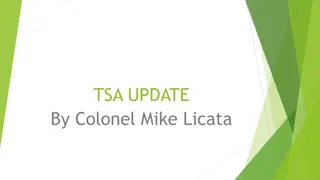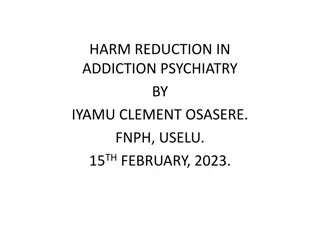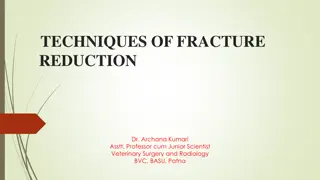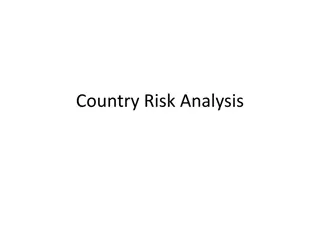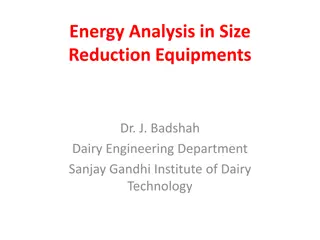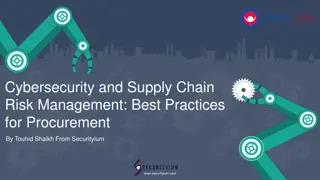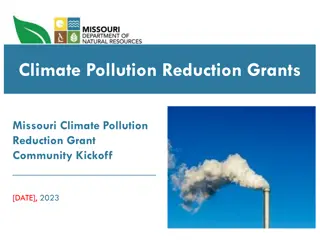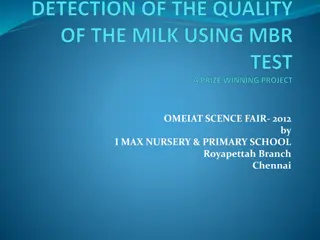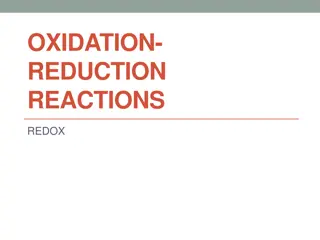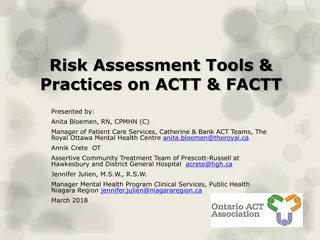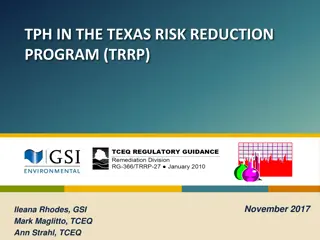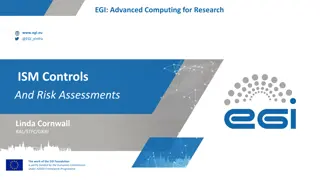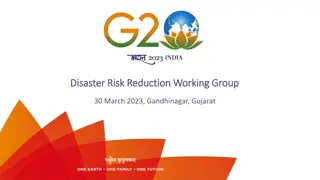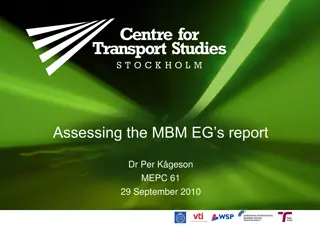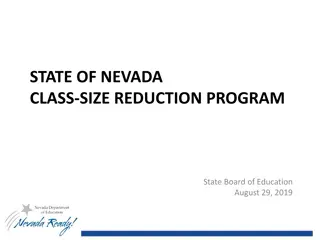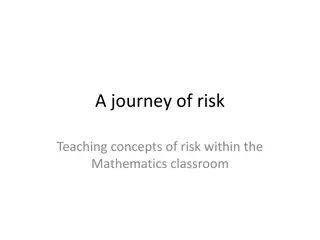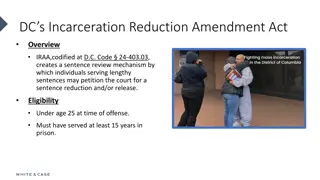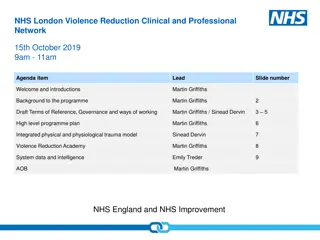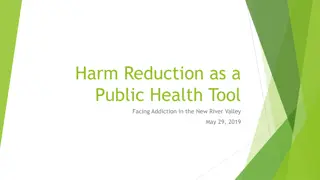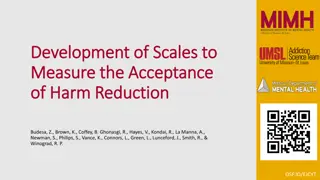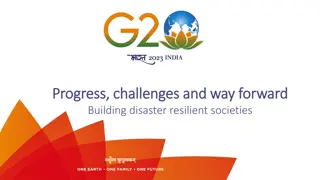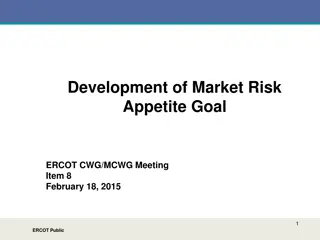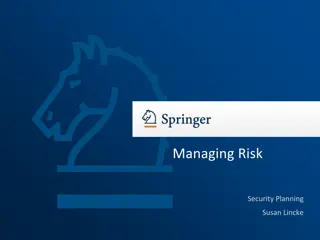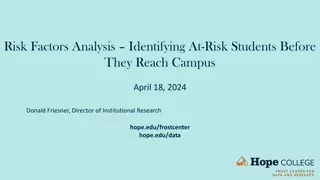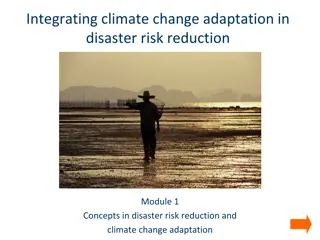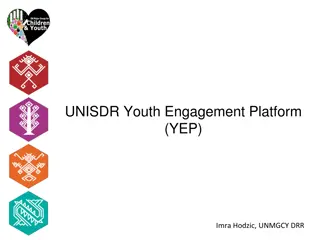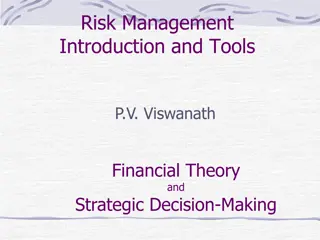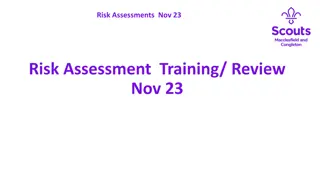Historic Investments in Climate Action: Inflation Reduction Act May 2023
The Inflation Reduction Act (IRA) of May 2023 focuses on making significant investments in climate action to reduce U.S. emissions by an estimated 40% by 2030. This act supports disadvantaged communities, the clean energy industry, and aims to drive emissions reductions over the next decade while pa
5 views • 14 slides
Understanding Risk Management in Environmental Geography and Disaster Management
Risk management in environmental geography and disaster management involves assessing the potential losses from hazards, evaluating vulnerability and exposure, and implementing strategies to mitigate risks. It includes calculating risk, dealing with risk through acceptance, avoidance, reduction, or
1 views • 10 slides
Introduction to Flood Risk Assessment with HEC-FDA Overview
This presentation delves into flood risk assessment using HEC-FDA software, covering topics such as defining flood risk, components of uncertainty, consequences of flood risk, and methods to assess flood risk including hydrology, hydraulics, geotechnical, and economics. It explores the intersection
6 views • 39 slides
TSA Security Guidelines and Risk Reduction Strategies
Explore the legal requirements for security coordination, assessments, and training as mandated by TSA. Discover what services and resources TSA offers, learn how to protect your company through risk assessment, planning, and training, and understand risk reduction strategies using the risk formula.
1 views • 19 slides
Harm Reduction in Addiction Psychiatry: A Comprehensive Overview
Harm reduction in addiction psychiatry is a client-centered approach that focuses on reducing negative consequences associated with substance use. This philosophy involves practical strategies and principles aimed at promoting safer drug use practices. The historical background traces the evolution
1 views • 40 slides
Techniques of Fracture Reduction in Veterinary Medicine
Explore the techniques of fracture reduction in veterinary surgery, including closed reduction and toggling method, explained by Dr. Archana Kumari. Learn about the advantages of closed reduction, indications for treatment, and the step-by-step technique involved in reducing fractures in animals. Di
0 views • 14 slides
Understanding Country Risk Analysis in International Business
Country risk analysis is crucial for multinational corporations (MNCs) to assess the potential impact of a country's environment on their financial outcomes. It includes evaluations of political and economic risks in foreign operations. Sovereign risk, political risk characteristics, and factors are
0 views • 61 slides
Understanding Energy Analysis in Size Reduction Equipments
This comprehensive overview delves into the energy analysis involved in size reduction equipment, exploring topics such as objectives of size reduction units, sieve analysis for particle size distribution, mesh number system, and mathematical models for energy analysis in size reduction units. Dr. J
0 views • 11 slides
Project Risk Management Fundamentals: A Comprehensive Overview
Project risk management involves minimizing potential risks and maximizing opportunities through processes such as risk management planning, risk identification, qualitative and quantitative risk analysis, risk response planning, and risk monitoring and control. Quantitative risk analysis assesses t
0 views • 41 slides
Cybersecurity and Supply Chain Risk Management Best Practices
Supply chain attacks pose a significant threat to software developers and suppliers by targeting source codes and build processes to distribute malware. This article discusses the importance of supply chain risk management, the various attack vectors involved, the industries at risk, and the repercu
0 views • 23 slides
Volkswagen Trust Climate Pollution Reduction Grants Missouri Community Kickoff
Volkswagen Trust Climate Pollution Reduction Grants are part of the Inflation Reduction Act, aiming to reduce greenhouse gas emissions. The grant breakdown includes $250 million for planning grants and $4.6 billion for plan implementation. Missouri's Department of Natural Resources is leading the pl
1 views • 18 slides
Methylene Blue Reduction Test for Milk Quality Assessment
The Methylene Blue Reduction (MBR) test is utilized to assess the quality of milk based on the reduction of color imparted by a dye. The disappearance of color indicates the presence of bacteria in milk. This test involves adding methylene blue dye to milk samples, observing the color change, and me
0 views • 20 slides
Understanding Oxidation-Reduction Reactions in Chemistry
Explore the concept of oxidation and reduction in chemistry, which are fundamental processes that occur simultaneously in oxidation-reduction reactions. Learn about the role of oxygen, different types of oxidation reactions beyond burning, such as bleaching stains, and the concept of reduction invol
0 views • 34 slides
Exploring Risk Assessment Tools and Practices in Community Mental Health Care
In March 2018, Anita Bloemen, Annik Crete, and Jennifer Julien presented insights on risk assessment practices in Assertive Community Treatment Teams. The focus was on enhancing frontline staff's comfort and confidence in delivering care outside hospital settings, emphasizing the need for ongoing aw
0 views • 32 slides
Overview of Texas Risk Reduction Program (TRRP) for TPH Environmental Impact
The Texas Risk Reduction Program (TRRP) provides guidelines for managing Total Petroleum Hydrocarbons (TPH) in environmental assessments. Different regulations and programs govern TPH analysis depending on the source, with specific methods like TCEQ Method 1005 and 1006 used for TPH analysis and det
0 views • 21 slides
Understanding Risk Concepts and Management Strategies in Finance
Explore the essential concepts of risk in finance, such as risk definition, risk profiles, financial exposure, and types of financial risks. Learn about risk vs. reward trade-offs, identifying risk profiles, and tools to control financial risk. Understand the balance between risk and return, and the
0 views • 18 slides
Risk and Return Assessment in Financial Management
This comprehensive presentation explores the intricacies of risk and return assessment in the realm of financial management. Delve into understanding risk concepts, measuring risk and return, major risk categories, and the impact of risk aversion on investment decisions. Gain insights into the manag
0 views • 62 slides
Risk Management and Security Controls in Research Computing
The European Grid Infrastructure (EGI) Foundation conducts risk assessments and implements security controls in collaboration with the EOSC-hub project. The risk assessments involve evaluating threats, determining likelihood and impact, and recommending treatment for high-risk threats. Results from
0 views • 13 slides
Risk Management & MPTF Portfolio Analysis at Programme Level for UN Somalia
This session delves into the world of risk management and portfolio analysis at the programme/project level, specifically focusing on the Risk Management Unit of the United Nations Somalia. It covers enterprise risk management standards, planned risk management actions, the role of RMU, joint risk m
0 views • 30 slides
Global Initiatives for Disaster Risk Reduction in Gandhinagar
The Disaster Risk Reduction Working Group (DRRWG) in Gandhinagar, Gujarat, is focusing on priorities such as early warning systems, resilient infrastructure, financing, disaster response, and recovery. There is a strong emphasis on the connection between disaster risk reduction and sustainable devel
0 views • 18 slides
Understanding Long-Term Reduction Risk in LGP Risk Management Options
In LGP risk management options, long-term reduction risk is a key concern due to factors such as load reductions, permanent grid modifications, and future grid expansion. Utilities must consider the potential impact on both customers and ratepayers, with uncertainties around grid upgrades and cost i
0 views • 10 slides
Maritime Emissions Reduction Strategies and Policy Instruments Overview
Assessment of the Expert Groups' reports on maritime emissions reduction strategies, emphasizing the need for multiple policy instruments targeting new ships, existing ships, and operational aspects. Discusses the negative side effects of flexible policies and the importance of imposing requirements
1 views • 23 slides
Alcohol and Cancer Risk: Understanding the Links
Alcohol consumption is linked to an increased risk of various cancers, including mouth, throat, esophagus, breast, liver, and colorectal cancers. Factors such as ethanol, acetaldehyde, nutrient absorption, estrogen levels, and liver cirrhosis play a role in this risk. Even light drinking can elevate
0 views • 17 slides
Nevada Class-Size Reduction Program Overview
The Nevada State Board of Education implemented the Class-Size Reduction Act to reduce pupil-to-teacher ratios in early grades. Research shows mixed results on the effects of class-size reduction, with studies from various states highlighting different outcomes. The history of class-size reduction r
0 views • 14 slides
Understanding Risk Concepts in the Mathematics Classroom
Risk is a concept integral to decision-making in various aspects of life. This resource explores how risk is defined in the real world, its relevance in the classroom, and strategies for teaching risk literacy to students. It delves into the multiple definitions of risk, risk analysis, and the emoti
0 views • 62 slides
Electrochemical Reduction of CO2 on Copper and Mixed Metal Oxides
Different methods for CO2 reduction have been studied, with electrochemical reduction showing promise due to its use of electricity from nonconventional sources. Research on copper's unique characteristics for producing various CO2 reduction products has led to investigations into optimizing activit
0 views • 30 slides
Advances in Fall Risk Assessment and Management for Older Adults
This presentation delves into updates on the stratification tool for fall risk in community-dwelling older adults, emphasizing the importance of early intervention through opportunistic health visits. It discusses a decision tree model for assessing fall risk, highlighting the significance of histor
0 views • 12 slides
DC's Incarceration Reduction Amendment Act Overview
The DC's Incarceration Reduction Amendment Act (IRAA) provides a mechanism for individuals under the age of 25 at the time of offense, who have served at least 15 years in prison, to petition for sentence reduction or release. This Act is based on key US Supreme Court cases relating to the Eighth Am
0 views • 7 slides
NHSL Violence Reduction Clinical & Professional Network Overview
The NHSL Violence Reduction Clinical & Professional Network aims to address the high number of violent incidents in London through a public health approach. Led by Martin Griffiths, the network provides a forum for clinicians and professionals to share expertise, offer strategic leadership, and supp
0 views • 9 slides
Utilizing Harm Reduction for Addressing Addiction in New River Valley
In this presentation, Michael E. Kilkenny discusses the importance of harm reduction as a public health tool in combating addiction issues in the New River Valley. The talk highlights the benefits of harm reduction, components of successful implementation, and measures of program success. It also ad
0 views • 20 slides
Development and Evaluation of Harm Reduction Acceptance Scales
Development of scales to measure the acceptance of harm reduction is crucial for understanding public attitudes towards harm reduction strategies. This project focuses on creating valid and reliable scales through a systematic process involving item development, data collection, analysis, and refine
0 views • 15 slides
Building Disaster Resilient Societies: Progress, Challenges, and the Way Forward
The discourse delves into the current landscape of disaster risk, the status of the Sendai Framework Targets, global DRR challenges identified during the Mid-term Review Process, and the proposed way forward for enhancing disaster resilience. It emphasizes shifting focus towards prevention and risk
0 views • 7 slides
Understanding Organizational Risk Appetite and Tolerance
Explore the development of market risk appetite goals and how to define and establish organizational risk tolerance. Learn about the Classic Simplified View of Risk Tolerance and different methods to determine risk appetite. Discover the importance of assessing market risk impact and aligning risk t
0 views • 8 slides
Developing a Risk Appetite Culture: Importance and Framework
Risk management plays a critical role in the success of corporations, with strategy and risk being intertwined. This presentation delves into definitions of key terms such as risk appetite, the Risk Appetite Cycle, characteristics of a well-defined risk appetite, and the importance of expressing ris
0 views • 31 slides
Security Planning and Risk Management Overview
This content provides an in-depth exploration of managing risk, security planning, and risk appetite in the context of cybersecurity. It covers essential concepts such as risk management process, threat types, risk analysis strategies, vulnerability assessment, and risk mitigation techniques. The ma
0 views • 73 slides
Risk Factors Analysis: Identifying At-Risk Students Before They Reach Campus
Risk Factors Analysis aims to identify students at risk of attrition before they even arrive on campus by evaluating academic, financial, minority, and first-generation factors. The method involves choosing specific risk factors, tracking historical prevalence, calculating relative risk, and predict
0 views • 15 slides
Integrating Climate Change Adaptation in Disaster Risk Reduction Module 1
Welcome to the e-Learning module on integrating climate change adaptation in disaster risk reduction. This module covers concepts in disaster risk reduction and climate change adaptation. It is part of a package that includes five modules focusing on vulnerability, disaster risk reduction, climate c
0 views • 29 slides
UNISDR Youth Engagement Platform: Empowering Young People in Disaster Risk Reduction
The UNISDR Youth Engagement Platform (YEP), led by Imra Hodzic from UNMGCY DRR, aims to involve young individuals in disaster risk reduction efforts. Through four main streams - Capacity Building, Policy & Advocacy, Youth Action, and Knowledge - YEP provides opportunities for youth-led initiatives,
0 views • 7 slides
Risk Management Overview and Tools in Financial Decision-Making
Understanding the distinction between risk and uncertainty is crucial in managing risks that affect welfare. Risk management involves assessing the trade-off between risk reduction benefits and costs, considering various risks faced by firms, and following a structured process of risk identification
0 views • 22 slides
Comprehensive Risk Assessment Training Overview
In this risk assessment training session held on November 23, participants reviewed the process of writing and reviewing risk assessments to enhance the quality of assessments for safer scouting experiences. The training aimed to improve leaders' skills and confidence in risk assessment practices wh
0 views • 37 slides



